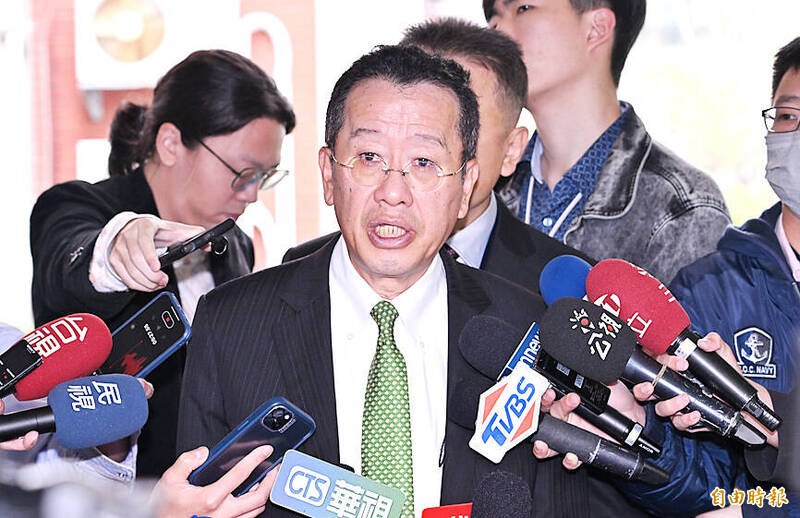《TAIPEI TIMES》 US collaborating on UAVs: Koo - 焦點 - 自由時報電子報

Minister of National Defense Wellington Koo speaks to reporters in Taipei yesterday. Photo: Liu Hsin-de, Taipei Times
2025/03/12 03:00
‘NON-RED SUPPLY CHAIN’:Taiwan-US partnerships in researching and developing civilian and military applications began when a US delegation visited Taiwan last year
By Fang Wei-li and Shelley Shan / Staff reporters
Washington is pursuing opportunities to work with Taiwan to form a “non-red supply chain” for uncrewed aerial vehicles (UAVs), and the partnership would lead to “significant results,” Minister of National Defense Wellington Koo (顧立雄) said yesterday.
While Beijing is aiming to establish a “red supply chain” to dominate the global market in advanced technologies, Taiwan and other democratic nations are countering the influence of China by establishing a “non-red supply chain.”
Koo was asked about partnerships between Taiwan and the US after American Institute in Taiwan Director Raymond Greene on Friday last week said in an exclusive interview with the Chinese-language Liberty Times (the sister newspaper of the Taipei Times) that the two nations could jointly produce dual-use drones and satellite systems.
Taiwan-US partnerships in researching and developing civilian and military applications began when a delegation from the US Department of Commerce visited Taiwan in September last year, Koo said, adding that they would soon generate significant results.
“The purpose of the partnerships is to use the two countries’ respective advantages to gradually reduce China’s market share in drones ... particularly in key components,” he said. “It has come to a point where it seems like we cannot avoid using China-made drone components. As such, we must build a safe ‘non-red supply chain.’ The most important thing is that Taiwan needs to have the capacity to produce drones that meet national defense requirements.”
Koo said a drone campus in Chiayi County’s Minsyong Township (民雄) would be used to research, develop and test drones, with manufacturing facilities at other locations.
Premier Cho Jung-tai (卓榮泰) separately yesterday told lawmakers that the government remains committed to developing diverse green energy sources, while keeping the door open to “new” nuclear power under certain conditions.
He made the comment in response to Greene’s statement that the US was looking to collaborate with Taiwan to ensure its energy supply keeps pace with growing electricity demand from technology companies.
He also called nuclear power “an exciting area for cooperation going forward” between the two sides.
Reducing carbon emissions is the priority and achieving net zero is the goal, Cho said, adding that the government remains committed to developing a diverse range of green energy sources.
The government would also focus on expediting converting the remaining coal-fired power generators to gas-fired generators, he said.
Taiwan does not rule out adopting “new nuclear energy,” provided that nuclear safety is ensured and a societal consensus on its use is reached, he said, adding that the government looks forward to engaging with leaders and developers of new technologies.
Meanwhile, Taiwanese men who have a Chinese ID must still serve military service in Taiwan, as per the Act Governing Relations Between the People of the Taiwan Area and the Mainland Area (臺灣地區與大陸地區人民關係條例), Koo said.
“Once these conscripts are in the military, we would assess their performance and scrutinize their activities. They would not be allowed to handle sensitive and confidential tasks. We will also offer counseling while they live in military camps,” he said.
Koo said the government would identify men with Chinese IDs, who would receive a notification from the Ministry of the Interior.
In addition, Koo said that the Ministry of National Defense would propose an amendment to Article 24 of the Criminal Code of the Armed Forces (陸海空軍刑法) to incriminate active-duty military personnel who pledge allegiance to the enemy, as such a regulation does not exist.
Under the proposed bill, active-duty military personnel who pledge loyalty to an enemy through speech, actions, words, pictures, digital records or other methods would face a prison sentence of one to seven years, the ministry said.
Additional reporting by CNA
新聞來源:TAIPEI TIMES
